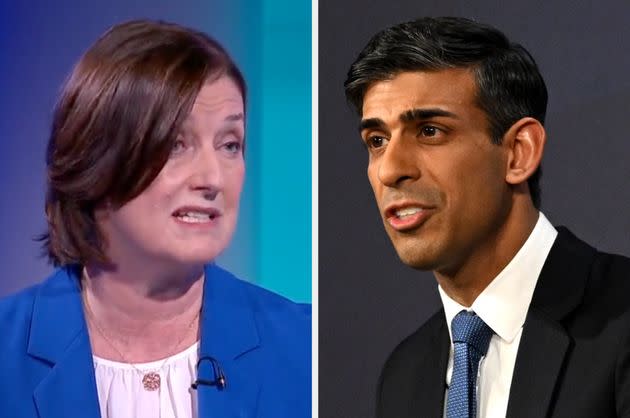UN Refugee Agency Is 'Very Concerned' About Legality Of UK's Illegal Migration Crackdown

The UN's Refugee Agency expressed concern over the new bill on BBC Newsnight
The government’s proposed crackdown on illegal migrants has already drawn criticism from the United Nations, hours after it was revealed in full.
The Illegal Migration Bill, unveiled in full on Tuesday, gives the home secretary a “duty to remove” refugees which takes precedence over someone’s right to claim asylum – which is being described as a breach of international law.
It also means that anyone who is removed will be banned from returning to the UK in the future.
The UK representative of the UN Refugee Agency, Vicky Tennant, told BBC Newsnight yesterday evening: “We are very concerned at the UN Refugee Agency.
“This is effectively closing off access to asylum to the UK for people arriving irregularly, we believe it’s a clear breach of the Refugee Convention.
“And remember, even people with very compelling claims will not have the opportunity to put these forward.”
Newsnight presenter Kirsty Wark then pointed out that this is a pre-election pledge which tackles an issue the general public are concerned about.
Tennant replied: “It’s a challenge that the UK also shares with other countries, including other EU countries, irregular arrivals at the southern borders, at the eastern borders of the EU.”
She pushed: “We say, look, get the asylum system working.”
She said legitimate asylum claims should be sped up, while those without sufficient claims can be sent back to their home country, and agreed that the UK “absolutely” needs proper controls on migration.
But the current plan, Tennant said, likely breaches international law by breaking the refugee convention “because it really closes down access to asylum”.
The UK representative continued: “That’s been a longstanding commitment by the UK, it’s a longstanding humanitarian tradition and it’s a very clear stepping away from that.”
Wark asked if this bill could even be implemented before the next general election.
“The challenge is that the bill has to go through, it has to be passed,” Tennant agreed. “I think one of the challenges is that the bills premised on the idea that there is a possibility to remove people to so-called safe third countries.
″Arrangements like that are possible, they need to hit certain standards, certain safeguards, but has already been pointed out by one of the other people there, those arrangements are not currently in place.”
Wark put it to the Tennant that she – and her colleagues – were part of the “activist blob” which Suella Braverman said would try to push back against the bill.
Tennant said in response that her agency “supports all efforts to trying to find practical solutions” and trying to bring about reforms to the asylum system and resettlement programmes.
“It breaches the Refugee Convention”
UK Rep. of the UN Refugee Agency, Vicky Tennant, says “we’re very concerned” about the Illegal Immigration Bill #Newsnight | https://t.co/P0zxS1DNGFpic.twitter.com/SAuC83Qjjy— BBC Newsnight (@BBCNewsnight) March 7, 2023
In a letter to MPs seen by HuffPost UK on Tuesday, the home secretary did admit that parts of her plan to stop small boats arriving on British shores may be “incompatible” with the European Convention on Human Rights.
She suggested that there may be more than 50% chance it will not align with the Human Rights Act, which enshrined the convention rights in the UK.
Braverman wrote: “This does not mean that the provisions in the bill are incompatible with the Convention rights, only that there is a more [than] 50% chance that they may not be.
“We are testing the limits but remain confident that this bill is compatible with international law.”

 Yahoo News
Yahoo News 